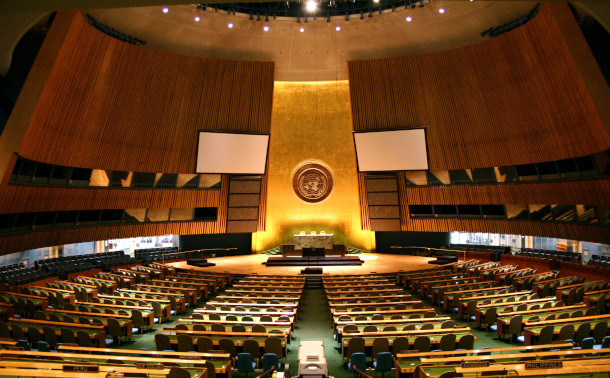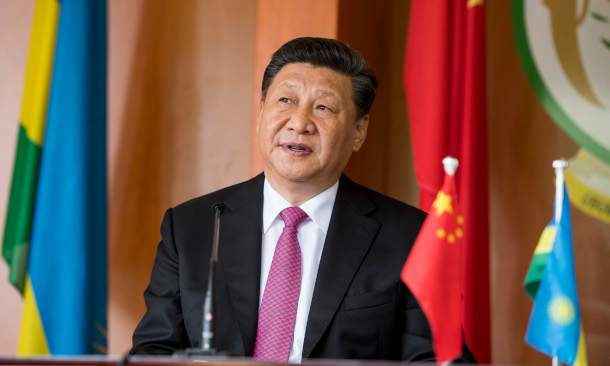China Leads on Climate
Air Date: Week of October 16, 2020

China‘s President Xi Jinping spoke to the UN General Assembly through video in 2020. (Photo: Patrick Gruban, Flickr, CC BY-SA 2.0)
At the annual UN General Assembly, President Xi of China pledged that his nation would peak its carbon emissions before 2030 and hit net zero emissions by 2060, without revealing how the nation plans to reach those goals. Joe Aldy, an economist and Professor of Public Policy at Harvard's Kennedy School, joins Host Steve Curwood to discuss what this step by the world’s largest greenhouse gas emitter means for international climate policy in the context of the failed climate leadership by the Trump Administration.
Transcript
CURWOOD: China has taken the lead in global climate change politics. In front of world leaders at the annual UN general assembly gathering President Xi of China pledged his nation would peak its carbon emissions before 2030, and reach net zero emissions by 2060. These commitments come in response to the Paris Climate Agreement. As the world’s largest single contributor to greenhouse gas emissions China’s move is the most significant so far under the pact, giving it a competitive and political edge as the US remains on the sidelines of the international climate pact. Joe Aldy is an economist and Professor of Public Policy at Harvard’s Kennedy School, and he joins us now. Joe, welcome back to Living on Earth!
ALDY: Steve, it's a pleasure to be here. Thanks for having me.
CURWOOD: So, if I look at the math, I think that China's responsible for about 28% of global carbon dioxide emissions these days. Put that in context for us, how important is it for them to make a commitment of reduction?
ALDY: Well, the challenge we face with climate change is that globally, greenhouse gas emissions have been increasing just about every year for the last four decades. This year, because of COVID, we'll see, I think globally, emissions fall. But China's emissions have been the fastest growing, especially over the past two decades. It was just a little bit more than a decade ago that China passed the US in terms of annual emissions. Now, China's emissions are double what they are in the United States. So if we are going to be up to, as a planet, the challenge of combating climate change, and avoiding some of the most catastrophic impacts of climate change, China has to be a critical player and changing its trajectory and dramatically lowering its emissions over time.
CURWOOD: What does carbon neutrality mean? And what do you think the Chinese mean by it?
ALDY: So, I don't know what the Chinese mean by carbon neutrality. We hear a couple different terms like this, like carbon neutral, or net zero, we hear this from countries, we hear this from companies. Carbon neutrality might mean that they are going to reduce their emissions as much as possible. And then to an extent, they still have some emissions, coming out of their plants, or their cars, or what have you. They may be investing in projects that will pull carbon dioxide out of the air, maybe it's planting trees, maybe doing things in another country, maybe investing in direct air capture technology, that captures the CO2 out of the air and puts it underground. So, that may be what they mean, but the President wasn't all that specific about it. And I think, you know, this is another illustration about the devils in the details.
CURWOOD: What do you think was China's strategy with making this pledge, this announcement, now?
ALDY: Well, I think there's a few audiences that the Chinese government have in mind. Certainly they made this announcement in New York, at the opening of the UN General Assembly, so they were trying to speak to the whole world, the international community. I think part of this is an effort to try to rebuild his reputation, because of how poorly they handled COVID-19 at the beginning of the year, and it truly took a horrific toll that's played across the planet. So, I think they recognize that climate change is an area where if they can demonstrate leadership, they can try to rebuild a relationship with other countries around the world and demonstrate their willingness to coordinate and cooperate on a pressing global risk, like climate change. I think they're also speaking to the United States. Now we've got incredible uncertainty about where US climate policy is going to go because of what's going to happen in November with our presidential election. If President Trump is reelected, I think it's trying to then further put the Trump administration in a corner as an isolationist because of their hostility to climate change. But I think they also recognize that if there's a President Elect Biden, you're going to see a United States government, that's going to be much more ambitious tackling climate change. You're going to see a new US government come out and say, here's what we're going to do in the near term to reduce our emissions. Here's our plan to go to net zero by 2050. And I think this is a way to try to anticipate the kind of pressure they would likely get from a Biden administration to lead on this. I think the third audience is their domestic audience, Steve.

President Xi Jinping’s statement is the first public declaration of China of their intent to reach carbon neutrality. (Photo: Paul Kagame, Flickr, CC BY-NC-ND 2.0)
CURWOOD: Mm hmm.
ALDY: And and I think part of is they're getting ready for the next five year plan. And that sort of sets forth policy that's going to drive their economy. And I think this is one way for Xi to go back to Beijing and say, we've made this commitment to the rest of the world, we need to actually start crafting our domestic policies to try to deliver on this.
CURWOOD: Now, some criticize this announcement from China as being too little too late. And others say it's unlikely China's actually going to, at the end of the day, step up to the challenge. What are your concerns about this pledge?
ALDY: Well, it is a bit ambiguous. So they're not telling us at what level their emissions are going to peak. They're not even really telling us what year their emissions are going to peak, they're just going to say they're going to peak before 2030. And that has implications about how credible the long term goal of carbon neutrality by 2060 is. But I think all this is a reflection that you can make these announcements in the international sphere. But you've got to demonstrate their credibility by the kinds of policies you put in place domestically. And so that's why it's going to be really important to see what Beijing comes forward with over the coming months and in 2021, in terms of domestic policy coming out of Beijing, as well as what we see even at the provincial level, and what they do to try to reduce their emissions by driving more renewable power, reducing their reliance on coal, despite the fact they're still building coal-fired power plants. So there is some tension here, I think between their economic strategy and what they need to do to deliver on this, but I think the real proof is going to be in the domestic program they develop over the next year.
CURWOOD: How expected was it that China would move ahead regardless of the US pulling out of or in the stages of pulling out of the Paris Climate Agreement?
ALDY: So I think it's interesting to see China doing this. They had been historically, over the past decade, a little, if you will, reluctant to make pledges in the international negotiations. So in the run up to the 2009 Copenhagen talks, they talked about how they would reduce the carbon intensity of their GDP by 2020. But it took a lot of personal negotiation by President Obama himself, to get them to commit to making that part of the Copenhagen Accord, which is the first time they ever made any kind of mitigation pledge in the international negotiations. Here, what we're seeing is actually, I think, one of the true strengths of the Paris framework, where countries would regularly pledge what they're going to do, review their pledges, and then update, revise and enhance those pledges. And so part of the negotiating process now, isn't really do we negotiate a new agreement? It's how do we update what we say we're going to do to reduce their emissions and in the lead up to next year, because of COVID, we've delayed the UN climate talks one year, but in November of 2021, the UN climate talks will meet in the UK and focus on what countries have done to enhance and revise their pledges. And so China is one of the first countries out of the gate, saying, here's how we can do more than what we previously pledged. So I think it's a positive sign for how the Paris framework works. And it may be just as important whether or not it galvanizes action by other developing countries to step up to the plate, and increase the ambition of their pledges, as much as how much we count the tons that will be reduced in China because of what they're saying they're going to do.
CURWOOD: For people who are really concerned about the climate crisis, what consequences do you hope this move will have for global climate policy? And how real of an advance is this as opposed to posturing?

Joe Aldy is an economist and professor of public policy at Harvard’s Kennedy School. (Photo: Courtesy of Joe Aldy)
ALDY: So the potential here is quite significant. Some scholars in Europe at the Climate Action Tracker, they estimate that if China actually delivers on carbon neutrality by 2060, it probably reduces warming in this century by two to three tenths of a degree Celsius. Which is actually quite substantial when that's just one country's actions. It's by far the largest single commitment to reducing warming that they've seen among any country that has made a pledge under the Paris framework. The challenge is all we have right now are a near term goal that's ambiguous and a 2060 goal on carbon neutrality that's a little bit ambiguous, because we really don't know what they mean by carbon neutrality. I think if they're able to sort of demonstrate through domestic policy actions, that they're really serious about this, I think that matters. I think it matters, too, to just have the head of state speaking about this issue. That signals I think, the seriousness. I think the EU, which has long been a leader on climate change, or say the small island states that have long been a vocal proponent for ambitious climate change, when they look at the US and China, they don't see the leaders speaking about climate change that much. So I think it does give them a little bit more reassurance that China is serious about this. So what I'm hopeful about is that this gets the attention of other countries around the world, that maybe is a first step towards rebuilding the US-China relationship that was so critical, late in the Obama administration, leading up to the Paris conference of 2015, That hopefully this gets us moving and moving faster and faster going forward. And that's where you can see and be optimistic about this. But you know, as an economist, I like to see the evidence, I like to see the policies that they're going to implement. So, I'm going to look to see what they came up with their five year plan and how they're going to be driving more clean energy investment in their economy going forward.
CURWOOD: China's step forward here certainly puts US leadership in question. But can the world survive the climate crisis without the United States moving forward in much more of a leadership role, Joe?
ALDY: No, the world needs the United States, there's no doubt about that. We need the United States to be a key player, because we have the resources. We have the scientists, we have the engineers. A lot of the technological innovation we need to get the world eventually to net zero is going to come out of the creativity in the entrepreneurship, and even scientists that are government labs all working together to tackle this problem. I can't imagine that the world can solve this problem without the United States. We saw that with Kyoto, when the United States didn't participate, global emissions continue to increase. We need the US involved. We need China involved. At the end of the day, we're going to need everybody involved. But we're going to need the biggest countries, the biggest sources of emissions, and the ones with the greatest resources to be at the forefront leading the global effort to combat climate change.
CURWOOD: Joe Aldy is a Professor of Public Policy at Harvard's Kennedy School. Joe, thanks so much for taking the time with us today.
ALDY: Well, thank you, Steve. I've enjoyed it.
Links
Climate Home News | “Xi Jinping: China Will Aim for Carbon Neutrality by 2060”
Living on Earth wants to hear from you!
Living on Earth
62 Calef Highway, Suite 212
Lee, NH 03861
Telephone: 617-287-4121
E-mail: comments@loe.org
Newsletter [Click here]
Donate to Living on Earth!
Living on Earth is an independent media program and relies entirely on contributions from listeners and institutions supporting public service. Please donate now to preserve an independent environmental voice.
NewsletterLiving on Earth offers a weekly delivery of the show's rundown to your mailbox. Sign up for our newsletter today!
 Sailors For The Sea: Be the change you want to sea.
Sailors For The Sea: Be the change you want to sea.
 The Grantham Foundation for the Protection of the Environment: Committed to protecting and improving the health of the global environment.
The Grantham Foundation for the Protection of the Environment: Committed to protecting and improving the health of the global environment.
 Contribute to Living on Earth and receive, as our gift to you, an archival print of one of Mark Seth Lender's extraordinary wildlife photographs. Follow the link to see Mark's current collection of photographs.
Contribute to Living on Earth and receive, as our gift to you, an archival print of one of Mark Seth Lender's extraordinary wildlife photographs. Follow the link to see Mark's current collection of photographs.
 Buy a signed copy of Mark Seth Lender's book Smeagull the Seagull & support Living on Earth
Buy a signed copy of Mark Seth Lender's book Smeagull the Seagull & support Living on Earth

